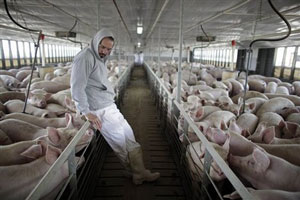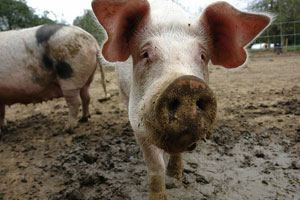Pig Farmer
Tasks & duties

Pig farmers may do some or all of the following:
-
provide food, care and shelter for pigs
-
attend to sows (female adult pigs) while they are giving birth
-
care for newborn piglets
-
maintain health standards to prevent disease in pigs
-
check equipment, such as automatic feeders and ventilators, are working properly
-
maintain equipment and make minor repairs, such as minor welding, engineering and building repairs
-
clean and disinfect buildings and yards
-
select animals for market and breeding
-
keep financial and farm records
-
train staff
-
plant, cultivate and harvest crops for feed
-
maintain overall care of pigs, such as changing their diets and living environments according to their age
-
Free-range pig farmers may also:
-
arrange rotational grazing programmes for animals
-
maintain free-range facilities such as fencing, water supply, and outdoor housing and wind shelters
Skills & knowledge

Pig farmers need to have:
-
knowledge of how animals react in different situations and how to deal with those reactions
-
an understanding of the life cycle and anatomy of pigs
-
knowledge of how to minimise disease
-
knowledge of the latest farming research and techniques
-
observational skills
-
animal-handling skills
-
good business and record-keeping skills
Entry requirements
There are no specific requirements for becoming a pig farmer as skills are gained on the job.
Some people find a job as a pig worker and then start training as an apprentice.
Secondary education
Although there are no specific secondary educational requirements, year 10 equivalent maths and English may be useful.
Training on the job
Pig farmers may attend seminars and conferences.
Useful experience
Useful experience for pig farmers includes working on a farm, work with pigs or other animals, or any experience with welding, tractor driving and using machinery.
Related courses
Agricultural Science
Animal Husbandry
Farm Management and Agribusiness
For more information, please refer to myfuture.
Document Actions
